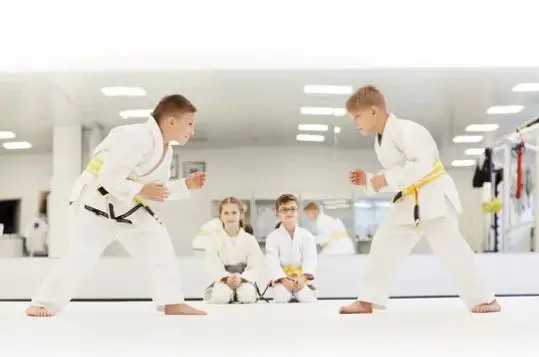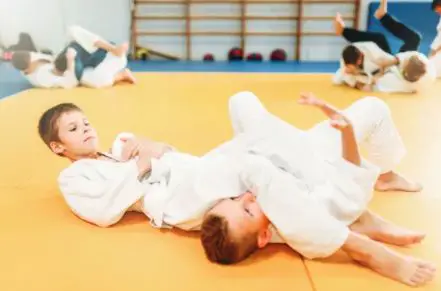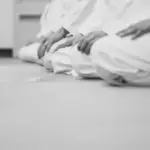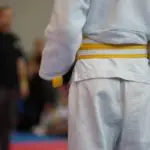If you have considered entering your child into an extra-curricular sport, you might have thought of Jiu-Jitsu. Martial arts can have amazing benefits for people at any age, especially children. There are also plenty of opportunities for competing. You may be worried, though, about allowing your child to compete against others at Jiu-Jitsu.
Competing in Jiu-Jitsu, provided your child is old enough and has trained long enough, is a perfectly healthy way to express themselves. Additionally, competing in such an event teaches children important life lessons that they may not receive anywhere else.
You know that the benefits of Jiu-Jitsu are numerous. So, how do you know if competitive Jiu-Jitsu is right for your child? How do you know if your child is old and mature enough to be able to compete? How do you know if your child has trained long enough in the sport to be competitive? Read on to find all of these answers.

When Can Your Child Start Competing In Jiu-Jitsu?
There is no magical age at which a child can start safely competing in the sport. The real answer here is that it depends. If you have an extremely talented child with an unnatural sense of maturity, then perhaps they can safely compete at a much younger age than is recommended.
However, if your child is normal, they should not compete in Jiu-Jitsu until they reach at least 8 to 10 years of age. There are a few reasons why it is not recommended to allow your child to complete before they are at least eight years old:
- Maturity level
- Understanding and Following the rules
- Sportsmanship
Your Child’s Maturity Level
If you have a normal child under eight years of age, the odds are that they are high-strung, self-absorbed, and have the attention span of a gnat. This is not any form of an attack on your child or your parenting. Rather, this is simply pointing out that the average child has these characteristics at that age.
Most children under eight years old do not yet comprehend the importance of sitting still and listening to instructions. They would much rather play with the other children around them or stare off into space thinking about something else, like playing with their favorite toy.
As children age and grow, they begin to learn how they are supposed to act around others. Additionally, they begin to learn to pay attention to lessons for a much longer period as they age.
Any martial arts training requires a certain degree of dedication and decorum built into not only the training but also the competitions. If your child is too young to understand this, they are too young to compete.
Understanding and Following the Rules
In any sport, there is a list of rules that must be followed for success. As stated above, if your child cannot sit still and learn the rules of the sport, they will not be able to compete properly. This will ruin the experience, not just for them but for everyone else trying to participate.
Jiu-Jitsu is just as much about respect and decorum as it is about the perfection of this specific martial art. To be successful in training and in a competition, your child needs to know and understand all the rules of the sport and competition event.
Do not rush your child into any competitive event, whether it is Jiu-Jitsu or some other sport. Make sure that they have developed the necessary skills and maturity to set them up for success.
Sportsmanship
Younger children tend not to understand nor appreciate how to act when they win or lose. It takes a degree of maturity for a child to understand the importance of winning or losing gracefully. That means not boasting after a win or sulking after a loss.
If your child still gets extremely upset when they lose, they are too young to participate in any Jiu-Jitsu competition. Likewise, if they are showboating around the mats every time they win, again, they are too young and immature to participate in a sporting event.

Enough cannot be said about the level of respect and decorum that goes along with Jiu-Jitsu. If your child cannot exemplify that in their actions, they are too young or immature to participate in a competition. The following characteristics are required in the sport of Jiu-Jitsu:
- Respect
- Decorum
- Self-control
- Dedication
All parents tend to believe that their child is great in whatever sport they are playing. To be frank, that is not always the case. While your child may be good at Jiu-Jitsu, do not rush them into competing if they are not mature enough to show good sportsmanship.
Your Child’s Jiu-Jitsu Proficiency
Age and maturity are not the only factors to consider when it comes to deciding to allow your child to participate in a competition. The level of proficiency they show with the sport is also important. There are a few factors to consider regarding the right time to introduce your child to a Jiu-Jitsu competition:
- Ability to perform the moves
- Ability to fall
- Coaches feedback
- Ability to learn from criticism
There are several techniques that, if not done properly, will result in an injury to either your child or their sparring partner. If your child does not know how to properly make all the necessary moves, they are not ready to participate in a Jiu-Jitsu competition.
Spend time talking with your child’s coaches to determine when they are physically and mentally capable of participating in a competition. If your child’s coach says that they completely understand the necessary moves and the sport, then it should be perfectly safe to enroll your child in an event.
However, if your child’s coach gives pause or says that your child is not ready, do not take that as a slight or an attack on you or your child. The coach knows what to look for and is well aware of your child’s capabilities and knowledge of Jiu-Jitsu. Trust them to help you make the right decision.
Benefits of Jiu-Jitsu Competitions
Once your child is mature and trained enough to compete, there are benefits for participating in a Jiu-Jitsu competition. Above all else, the biggest benefit is the life lesson that they receive when they lose and the pride they feel when they win. Your child will learn:
- Humility
- Pride
- Personal development
- Perseverance
- Physical fitness
Learning to lose with dignity and realizing that it is not the end of the world is huge in a child’s success. Realizing that losing a competition is not the end of the world and realizing that they have people that they can lean on when times are tough, like their parents, coaches, and teammates, is key in their development.
Additionally, achieving physical fitness while training and competing is another benefit. A child learning to take pride in their physical fitness and the times that they do win a Jiu-Jitsu competition is also key to their developmental success.
Final Thoughts
Jiu-Jitsu is a highly competitive and difficult sport for anyone to learn, especially a child. Knowing when your child is ready or not when it comes time for competition is key in their eventual success in the sport.
If your child has learned and shows proficiency in the moves that their coach has taught them, and they are mature enough to understand the rules of the game and sportsmanship, it is safe for your child to compete. Participating in Jiu-Jitsu competitions helps teach your child discipline, etiquette, and sportsmanship.
And, if you are unsure of your child’s skill, ask the Jiu-Jitsu instructor if they feel like your child is ready to compete! Many instructors will make an effort to go to the tournament to help coach the children they teach.


